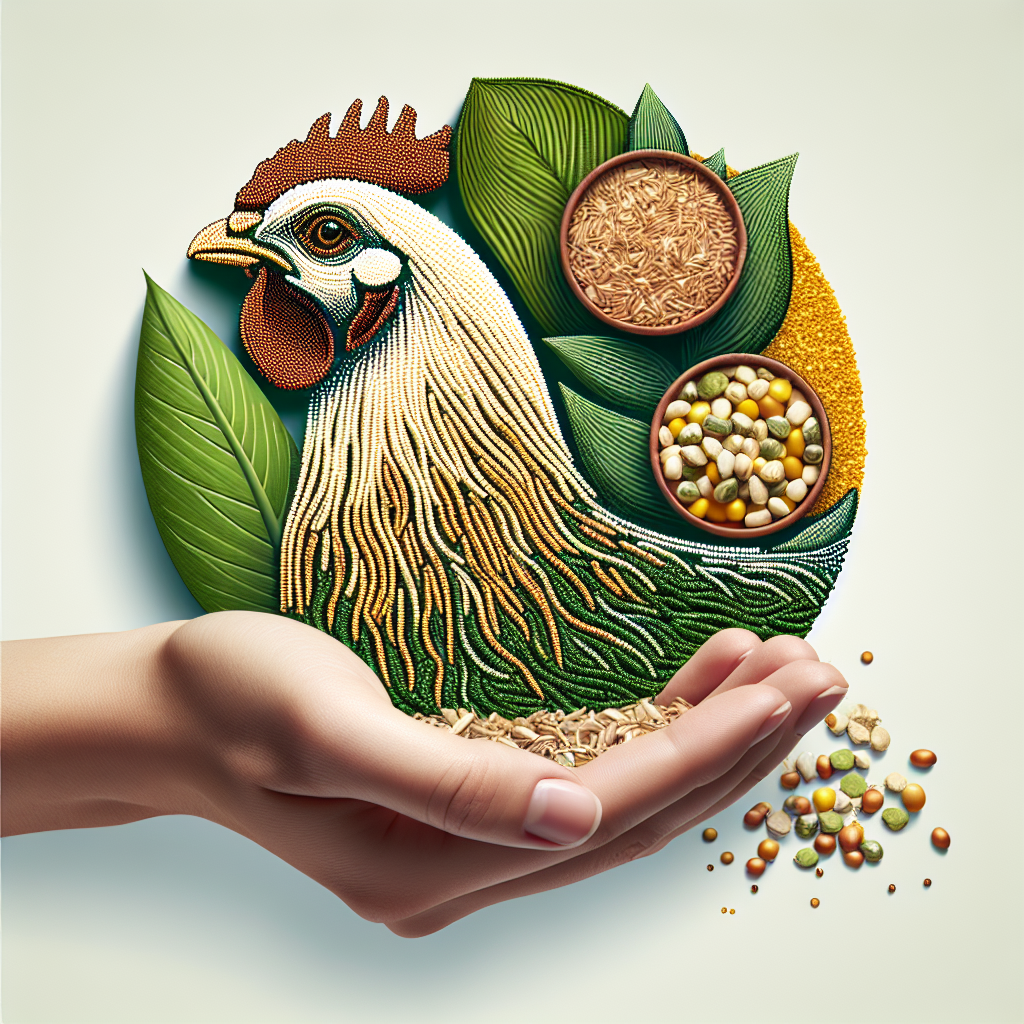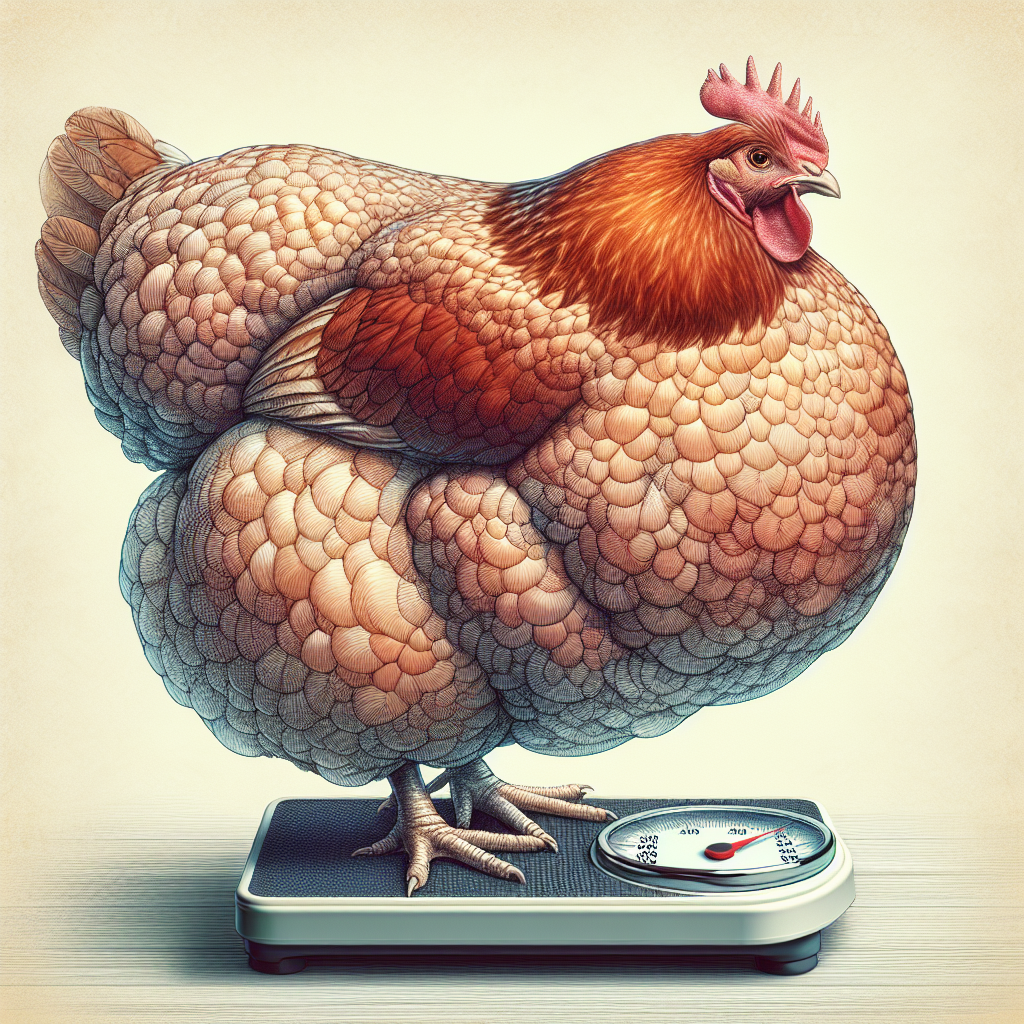If you’ve ever raised chickens or are considering getting a flock of your own, it’s important to keep an eye out for any signs of nutritional deficiencies in your feathered friends. Just like humans, chickens need a balanced diet to stay healthy and thrive. In this article, we’ll explore some common signs that may indicate your chickens are lacking essential nutrients, so you can take the necessary steps to ensure their well-being. So, grab a cup of tea, find a cozy spot, and let’s dive into the fascinating world of chicken nutrition!
Vitamin Deficiencies
Lack of Energy and Weakness
When your chickens are lacking in essential vitamins, such as Vitamin B12 or Vitamin E, they may exhibit signs of fatigue and weakness. You might notice that they are less active and seem to have a lower energy level. They may not engage in their usual activities, such as scratching for insects or enthusiastically pecking at their feed. If your chickens seem sluggish or lethargic, a deficiency in vitamins could be the culprit.
Poor Feather Quality
Another sign of vitamin deficiencies in chickens can be poor feather quality. Healthy chickens have shiny, well-maintained feathers that provide insulation and protection from the elements. However, if your chickens are lacking certain vitamins, such as Vitamin A or biotin, you may start to notice that their feathers appear dull, ragged, and unkempt. Feathers might break easily, and your chickens may develop bare patches or even bald spots. If you see the quality of your chickens’ feathers declining, it’s important to address any potential vitamin deficiencies.
Reduced Egg Production
Vitamin deficiencies can also impact your chickens’ ability to produce eggs. Certain vitamins, such as Vitamin D or Vitamin E, play a crucial role in the reproductive cycle of hens. If your chickens are lacking in these vitamins, you may notice a decrease in their egg production. They may lay fewer eggs, or the eggs they lay may be smaller in size. Additionally, the quality of the eggs may be compromised, with thinner shells or odd shapes. Monitoring your chickens’ egg production is essential for spotting any potential vitamin deficiencies.
Mineral Deficiencies
Slow Growth and Development
Minerals, such as zinc and selenium, are vital to the healthy growth and development of chickens. If your chickens are experiencing mineral deficiencies, you may observe that they are not growing as quickly as expected. They may appear smaller or stunted in comparison to their flock mates. Additionally, their overall development, including muscle and bone development, may be compromised. If you notice that your chickens’ growth is significantly slower than usual, it could indicate mineral deficiencies.
Thin or Brittle Bones
Mineral deficiencies, particularly a lack of calcium or phosphorus, can have serious implications for the health of your chickens’ bones. Calcium is essential for strong bones and eggshell formation, while phosphorus helps with bone mineralization. Without an adequate supply of these minerals, your chickens may develop thin or brittle bones. This can make them more prone to fractures or breaks, even from minor accidents or movements. Regularly inspecting your chickens and watching for any signs of bone weakness can help you detect and address mineral deficiencies.
Muscle Tremors
A deficiency in minerals like magnesium or potassium can result in muscle tremors in chickens. These tremors may manifest as subtle twitches or more pronounced shaking in various parts of the body. You may notice your chickens exhibiting uncontrolled movements or trembling when they are at rest or engaged in activities. Muscle tremors can affect your chickens’ mobility and coordination, so it’s important to be vigilant for any signs of these deficiencies.
Protein Deficiencies
Stunted Growth
Proteins are the building blocks for growth and development in chickens. Without adequate protein intake, your chickens may experience stunted growth. They may be noticeably smaller in size compared to healthy chickens of the same age. This lack of growth can also impact the overall development of their muscles and organs. If you see that your chickens are not growing as expected, it’s crucial to consider the possibility of protein deficiencies.
Delayed Feather Development
Protein deficiencies can also affect the development of feathers in chickens. Feathers are primarily composed of proteins, and without a sufficient supply, your chickens’ feathers may take longer to grow and fully develop. This delay in feather development can result in chickens having patches of bare skin or only partial feather coverage. It’s important to pay attention to the progress of your chickens’ feather growth to identify any potential protein deficiencies.
Reduced Egg Production
Protein deficiencies can impact egg production in chickens as well. Proteins are crucial for the formation of egg whites and yolks, and a lack of protein can disrupt the reproductive cycle of hens. You may notice a decrease in the number of eggs your chickens lay or a decline in the quality of the eggs produced. Thin or misshapen eggshells, along with smaller-sized eggs, can indicate protein deficiencies. Monitoring your chickens’ egg production is vital for identifying and addressing any protein deficiencies.
Calcium Deficiency
Thin or Soft Eggshells
Calcium is essential for the formation of strong eggshells. If your chickens are lacking sufficient calcium, their eggs may have thin or soft shells. These fragile shells can easily crack or break, leading to potential issues during incubation or egg handling. You might notice that your chickens are laying eggs with an abnormal texture or that they are more prone to breaking during collection. Addressing calcium deficiencies is crucial for maintaining healthy egg production.
Weak Bones and Leg Problems
Calcium is also crucial for maintaining strong bones and healthy leg development in chickens. If your chickens are calcium deficient, they may develop weak bones and exhibit leg problems. You might notice your chickens limping, favoring one leg, or having difficulty standing or walking. These issues can significantly impact their mobility, overall health, and quality of life. It’s important to provide your chickens with a consistent supply of calcium to avoid these problems.
Egg Binding
Egg binding is a serious condition in which a hen struggles to expel an egg from her reproductive tract. Calcium deficiency can increase the risk of egg binding in chickens. If your hen is calcium deficient, she may experience difficulties in passing an egg, leading to distress and potential health complications. Signs of egg binding include straining, lethargy, and the absence of egg production. Addressing calcium deficiencies is essential to minimize the risk of egg binding in your flock.
Phosphorus Deficiency
Loss of Appetite
Phosphorus plays a crucial role in your chickens’ metabolism and overall health. If your chickens are lacking in phosphorus, they may exhibit a loss of appetite. You may observe that they are less interested in their regular feed or become selective in what they eat. A decreased appetite can lead to weight loss and a decline in overall health. Monitoring your chickens’ eating habits can help you detect and address any phosphorus deficiencies.
Slow Growth
Phosphorus deficiency can significantly impact the growth rate of your chickens. Without an adequate supply of phosphorus, they may experience slower growth compared to healthy chickens of the same age. You may notice that they appear smaller or not as robust as expected. Additionally, their muscle development may be compromised, affecting their overall strength and physical abilities. Regularly assessing your chickens’ growth is important for identifying potential phosphorus deficiencies.
Reduced Eggshell Quality
Phosphorus is essential for the proper formation of eggshells in chickens. A deficiency in phosphorus can result in reduced eggshell quality. You may observe that your chickens’ eggs have thin or misshapen shells, making them more susceptible to damage. Poor eggshell quality can negatively impact the incubation process and lead to higher levels of egg breakage. Maintaining adequate phosphorus levels in your chickens’ diet is crucial for ensuring healthy egg production.
Vitamin D Deficiency
Rickets
Vitamin D plays a crucial role in the absorption of calcium and phosphorus, essential minerals for healthy bone development. A deficiency in Vitamin D can lead to a condition called rickets in chickens. Rickets causes skeletal deformities and weak bones, making your chickens more susceptible to fractures and other bone-related issues. Signs of rickets can include unusual leg or wing deformities, beak abnormalities, and reduced mobility. Ensuring your chickens have sufficient Vitamin D is vital for preventing rickets.
Weak Bones and Leg Problems
Vitamin D deficiency can also result in weak bones and leg problems in chickens. Without adequate levels of Vitamin D, your chickens may develop bones that are more fragile and prone to breakage. You may notice your chickens experiencing difficulties with standing or walking, exhibiting lameness or favoring one leg. These issues can significantly impact their overall mobility and quality of life. Providing your chickens with appropriate levels of Vitamin D can help strengthen their bones and prevent leg problems.
Decreased Egg Quality
Vitamin D deficiency can affect the quality of eggs produced by your chickens. Eggs laid by chickens lacking sufficient Vitamin D may have thinner shells or other abnormalities. Thin shells can increase the risk of egg breakage, compromised incubation, and difficulties during handling. Additionally, eggs laid by chickens with Vitamin D deficiency may have altered yolk color or consistency. Monitoring the quality of your chickens’ eggs is essential for identifying and addressing any Vitamin D deficiencies.
Iron Deficiency
Pale Skin and Comb
Iron is necessary for the production of red blood cells and oxygen transport in chickens. When your chickens are iron deficient, they may exhibit pale skin and comb. Their normally vibrant comb, the fleshy crest on top of their heads, may appear pale or washed out. Additionally, their skin may lack the healthy pink or red coloration it typically has. These changes in skin and comb color can indicate potential iron deficiencies and should be addressed promptly.
Decreased Appetite
Iron deficiency can also impact your chickens’ appetite. When chickens lack sufficient iron, they may experience a decreased appetite, leading to reduced feed consumption. You may notice that their interest in their regular feed diminishes, and they become picky eaters. A decreased appetite can result in weight loss and poor overall health. Monitoring your chickens’ eating habits is crucial for detecting any potential iron deficiencies.
Reduced Egg Production
Iron deficiency can also affect your chickens’ egg production. Iron is involved in the reproductive cycle of hens, and a lack of iron can disrupt their ability to lay eggs. You may notice a decrease in the number of eggs your chickens lay or a decline in the quality of the eggs produced. Additionally, the shells of the eggs may be thinner or misshapen. Monitoring your chickens’ egg production and quality can help identify and address any potential iron deficiencies.
Copper Deficiency
Coat Discoloration
Copper is an essential mineral that plays a role in various physiological processes in chickens. When your chickens are copper deficient, you may notice discoloration in their feathers or coat. Their feathers may lose their normal luster and vibrancy, appearing dull or faded. Additionally, chickens with copper deficiency may develop patches of discoloration on their skin, such as lighter or darker spots. Inspecting your chickens’ feathers and coat regularly can help you identify and address copper deficiencies.
Slow Growth
Copper deficiency can also impact the growth rate of your chickens. Without adequate levels of copper, they may experience slower growth and development. You may observe that they appear smaller or not as robust as expected for their age. Copper is involved in various metabolic processes that contribute to growth, so deficiencies can significantly affect your chickens’ overall development. Regularly monitoring your chickens’ growth is crucial for identifying potential copper deficiencies.
Anemia
Copper is essential for the production of healthy red blood cells in chickens. When they lack sufficient copper, chickens may develop anemia. Anemia is a condition characterized by low red blood cell counts or poor quality red blood cells. This can result in reduced oxygen-carrying capacity in the blood, leading to fatigue, weakness, and decreased overall health. If your chickens appear lethargic or exhibit signs of anemia, addressing copper deficiencies is essential.
Iodine Deficiency
Enlarged Thyroid Gland
Iodine is crucial for the proper function of the thyroid gland in chickens. When chickens lack adequate iodine, their thyroid gland may become enlarged, leading to a condition known as goiter. You may notice a visible swelling at the base of their necks, indicating an enlarged thyroid gland. The goiter may restrict breathing and swallowing, causing discomfort and distress for your chickens. Ensuring they receive sufficient iodine is important for maintaining thyroid health.
Slow Growth
Iodine deficiency can also affect the growth rate of your chickens. Without adequate levels of iodine, they may experience slower growth compared to healthy chickens of the same age. You may observe that they appear smaller or not as robust as expected. Additionally, iodine is involved in various metabolic processes that contribute to growth, so deficiencies can have a significant impact on your chickens’ overall development. Regularly monitoring your chickens’ growth is crucial for identifying potential iodine deficiencies.
Reduced Egg Production
Iodine deficiency can also impact your chickens’ egg production. Iodine plays a vital role in the reproductive cycle of hens, and a lack of iodine can disrupt their ability to lay eggs. You may notice a decrease in the number of eggs your chickens produce or a decline in the quality of the eggs. Additionally, the shells of the eggs may be thinner or misshapen. Monitoring your chickens’ egg production and quality can help detect and address any potential iodine deficiencies.
Vitamin A Deficiency
Poor Night Vision
Vitamin A is essential for maintaining healthy eyesight in chickens. When they lack sufficient Vitamin A, you may observe signs of poor night vision. Chickens with Vitamin A deficiency may have difficulty seeing in dim or low-light conditions. You might notice that they struggle to navigate their environment during the evening or exhibit signs of disorientation when it’s darker. Ensuring your chickens receive adequate Vitamin A is important for maintaining their visual health.
Respiratory Problems
Vitamin A plays a vital role in maintaining the health of the respiratory system in chickens. When they are deficient in Vitamin A, chickens may be more susceptible to respiratory infections and other respiratory problems. You may observe signs such as excessive coughing, sneezing, or nasal discharge. Additionally, chickens with Vitamin A deficiency may exhibit difficulty breathing or develop respiratory-related complications. Ensuring your chickens’ diet includes sufficient Vitamin A can help maintain their respiratory health.
Reduced Egg Production
Vitamin A deficiency can also impact your chickens’ egg production. Vitamin A is involved in the reproductive cycle of hens, and a lack of Vitamin A can disrupt their ability to lay eggs. You may notice a decrease in the number of eggs your chickens produce or a decline in the quality of the eggs. Additionally, the shells of the eggs may be thinner or misshapen. Monitoring your chickens’ egg production and quality is essential for identifying and addressing any potential Vitamin A deficiencies.
In conclusion, nutritional deficiencies can have significant impacts on the health and productivity of your chickens. Lack of energy and weakness, poor feather quality, reduced egg production, slow growth and development, thin or brittle bones, muscle tremors, stunted growth, delayed feather development, thin or soft eggshells, weak bones and leg problems, egg binding, loss of appetite, decreased eggshell quality, rickets, decreased egg quality, pale skin and comb, coat discoloration, anemia, enlarged thyroid gland, respiratory problems, and poor night vision are all potential signs of nutritional deficiencies in chickens. Monitoring your chickens’ health and providing a balanced diet that includes essential vitamins, minerals, proteins, calcium, phosphorus, Vitamin D, iron, copper, iodine, and Vitamin A is vital for preventing and addressing nutritional deficiencies. By ensuring your chickens receive the necessary nutrients, you can promote their overall well-being and maintain optimal production levels.




